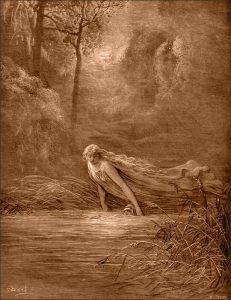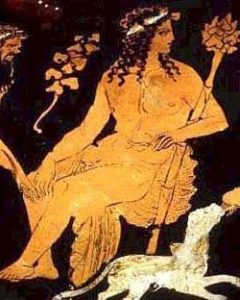Lethe and Memories Lost
We all know of the Greek under-world Hades and the river Styx, but were you aware that the River Styx was one of five rivers of the underworld. They are or were
Lethe, the river of forgetfulness,
Styx, the river of hate,
Acheron, the river of sorrow,
Cocytus, the river of lamentation. and
Phlegethon, the river of fire.
It bordered Elysium, the final resting place of the virtuous it flowed through the cave of Hypnos, god of sleep, where it’s murmuring would induce drowsiness. The shades of the dead were required to drink the waters of the Lethe in order to forget their earthly life. In the Aeneid, Virgil writes that it is only when the dead have had their memories erased by the Lethe that they may be reincarnated. As a person living with dementia I find this area of mythology both interesting and relevant. Indeed the journey to Elysium has many parallels with our own journey.  Lethe was also the name of a Goddess. She was personification of forgetfulness and oblivion, with whom the river was often associated. She was identified as the daughter of Eris (“strife”), and the sister of Ponos (“Hardship”), Limos (“Starvation”), Algae (“Pains”), Hysminai (“Battles”), Makhai (“Wars”), Phonoi (“Murders”), Androktasiai (“Manslaughters”), Neikea (“Quarrels”), Pseudea (“Lies”), Logoi (“Stories”), Amphillogiai (“Disputes”), Dysnomia (“Anarchy”), Ate (“Ruin”), and Horkos (“Oath”). It seems memory loss had some impressive company. This may partially explain the stigmas we experience today. On the brighter side it would seem that memory loss is the most virtuous daughter of this family. Some ancient Greeks believed that souls were made to drink from the river before being reincarnated, so they would not remember their past lives. The Myth of Er at the end of Plato’s Republic tells of the dead arriving at the “plain of Lethe”, through which the river Ameles (“careless”) runs. A few mystery religions taught the existence of another river, the Mnemosyne; those who drank from the Mnemosyne would remember everything and attain omniscience. Initiates were taught that they would receive a choice of rivers to drink from after death, and to drink from Mnemosyne instead of Lethe. This is where we went wrong! These two rivers are attested in several verse inscriptions on gold plates dating to the 4th century BC and onward, found at Thurii in Southern Italy and elsewhere throughout the Greek world. There were rivers of Lethe and Mnemosyne at the oracular shrine of Trophonius in Boeotia, from which worshippers would drink before making oracular consultations with the god. Today there are many places both rivers and towns named Lethe. Why? Our forebears no doubt forgot. It intrigues me that that some of my friends from the UK often mention Lethe or towns that sound very similar as places they are likely to visit. My regret is that I have drank from the Lethe, and not followed my name sake Dionysius and drank of the river of wine instead.
Lethe was also the name of a Goddess. She was personification of forgetfulness and oblivion, with whom the river was often associated. She was identified as the daughter of Eris (“strife”), and the sister of Ponos (“Hardship”), Limos (“Starvation”), Algae (“Pains”), Hysminai (“Battles”), Makhai (“Wars”), Phonoi (“Murders”), Androktasiai (“Manslaughters”), Neikea (“Quarrels”), Pseudea (“Lies”), Logoi (“Stories”), Amphillogiai (“Disputes”), Dysnomia (“Anarchy”), Ate (“Ruin”), and Horkos (“Oath”). It seems memory loss had some impressive company. This may partially explain the stigmas we experience today. On the brighter side it would seem that memory loss is the most virtuous daughter of this family. Some ancient Greeks believed that souls were made to drink from the river before being reincarnated, so they would not remember their past lives. The Myth of Er at the end of Plato’s Republic tells of the dead arriving at the “plain of Lethe”, through which the river Ameles (“careless”) runs. A few mystery religions taught the existence of another river, the Mnemosyne; those who drank from the Mnemosyne would remember everything and attain omniscience. Initiates were taught that they would receive a choice of rivers to drink from after death, and to drink from Mnemosyne instead of Lethe. This is where we went wrong! These two rivers are attested in several verse inscriptions on gold plates dating to the 4th century BC and onward, found at Thurii in Southern Italy and elsewhere throughout the Greek world. There were rivers of Lethe and Mnemosyne at the oracular shrine of Trophonius in Boeotia, from which worshippers would drink before making oracular consultations with the god. Today there are many places both rivers and towns named Lethe. Why? Our forebears no doubt forgot. It intrigues me that that some of my friends from the UK often mention Lethe or towns that sound very similar as places they are likely to visit. My regret is that I have drank from the Lethe, and not followed my name sake Dionysius and drank of the river of wine instead. 

Leave a Reply